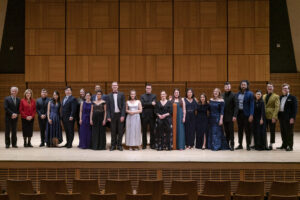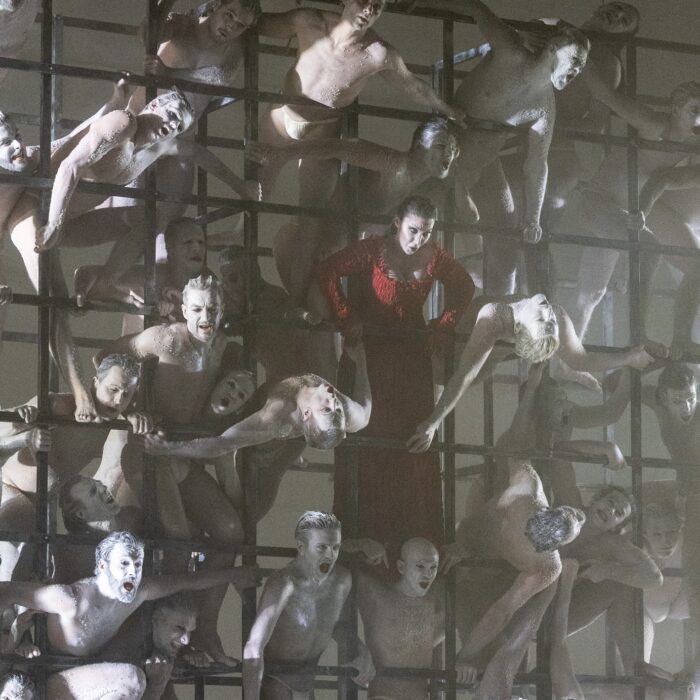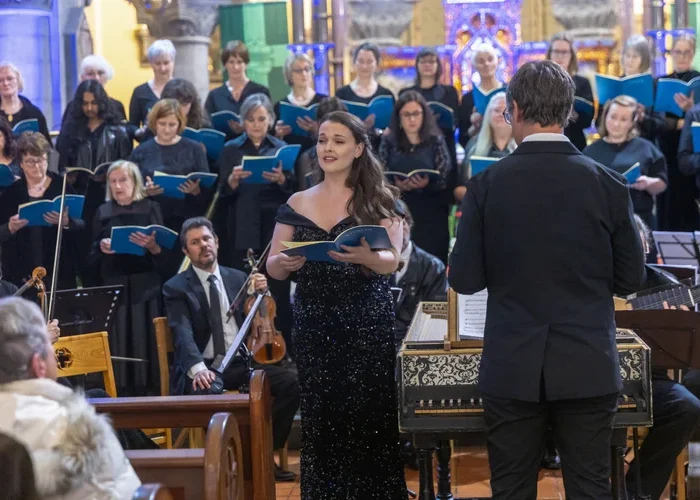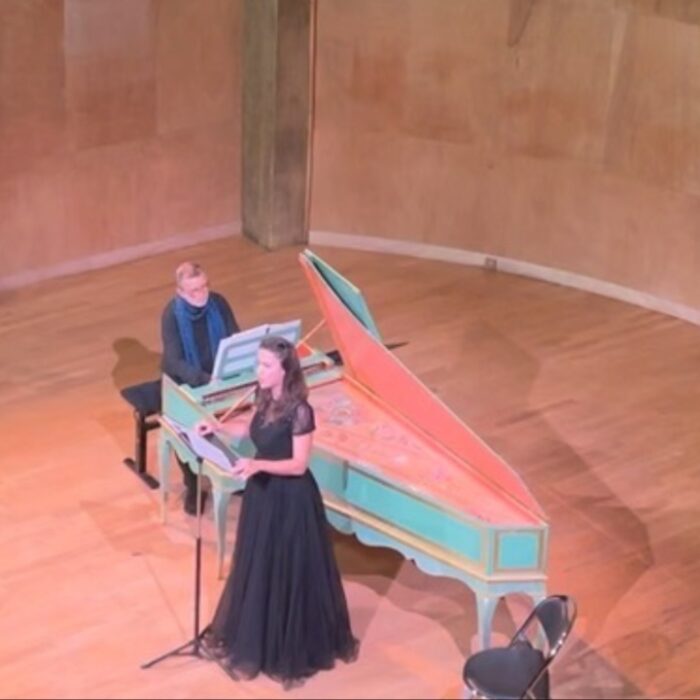
Carnegie Hall 2023 Review: SongStudio’s Young Artist Recital
By Chris RuelPhoto : Jennifer Taylor
Carnegie Hall’s Zankel Hall was filled with the wondrous sounds of a talented group of young artists in recital, each of whom had taken part in the 2023 SongStudio. The concert was the culmination of a weeklong series of workshops and masterclasses taught by renowned vocalists Golda Schultz, Hartmut Höll (pianist), and Jamie Barton.
Under the guidance of artistic director Renée Fleming, SongStudio is dedicated to reinvigorating the tradition of recitals. The previous evening, the artists took part in a masterclass with world-renowned mezzo-soprano Jamie Barton. During the session, Barton emphasized the narrative aspect of art song performance, encouraging the vocalists to connect with the text and tell a story with nuanced techniques that grab the attention of those in the seats. Artists who do more than sing the notes leave lasting impressions on their audiences.
Barton’s teaching style was lively, kind, and funny, and she showed respect and admiration for each singer with whom she worked. Her major thrust during the evening was to teach the nuances of storytelling, challenging each singer to bring excitement to the stage and avoid a yawn-inducing performance. She posed questions like: “Do you understand the meaning of the text?” “What inspired you to choose this piece?” and the critical question, “What is your personal connection to the song?”
Barton’s point was clear: if you, as the singer, cannot answer these questions, how can you deliver the text meaningfully? She emphasized that the key to recital success is trusting your instrument enough to be brave and not to hold back. There’s an aspect of vulnerability when singers “love the text” (Barton’s term) and reveal parts of their life through the music and text of others.
For some of the young artists, most of whom have had stage time at named houses, executing Barton’s approach felt unfamiliar and uncomfortable at times. But when they followed her teaching, the improvement in their performances was apparent.
After working with Barton on their storytelling, the question was: would the vocalists bring those lessons to the recital? (Not all artists worked one-on-one with Barton, but they were present and didn’t miss out on her coaching.)
Storytelling on Display
Each performance was a gem of musical storytelling from both the vocalist and their collaborative pianists. The pianists are the vocalist’s maestro, and together, the young artists work hand-in-hand, blending their talents seamlessly and creating a magical, musical mind-meld.
The tight interplay between collaborative pianists and vocalists is not optional if a memorable performance is their goal. They share narrative responsibilities. A bland singer with a boring pianist is a bummer, and vice versa.
All the above were on display during the Young Artist Recital. Each participant had a strong outing. Listed below are the names of the artists and their repertoire. Four aren’t listed; we’ll discuss their performances in greater detail.
In order of appearance, the young artists who took part in the 2023 SongStudio were:
Mezzo soprano Maire Therese Carmack with pianist Pei-Hsuan Lin, who took on Jake Heggie’s “Animal Passion and R. Strauss’ “Befreit,” Op. 39, No. 4.
Tenor Zhouhan Sun and pianist Yuriko Watanabe presented Hugo Wolf’s “Ganymed” and Frank Bridge’s “Love went a-riding.”
Soprano Eirin Rognerud and her pianist partner performed selections of Eyvind Alnae’s “Fire Digte,” Op. 30. — “Ved Syrintid,” and “Tidlig Sommermorgen.”
Baritone Yuriy Hadzetskyy, with pianist You Zhao, delivered Schumann’s “Belsatzar,” Op.57, and Ralph Vaughan Williams; “Bright is the ring of words.”
Soprano Charlotte Wajnberg and pianist Aaron Wajnberg performed Joseph Jongen’s “Chanson roumaine,” and Joaquín Turina’s “Los dos miedos.”
Baritone Joël Terrin and pianist Cole Knutson presented Francis Poulenc’s “Tu vois le feu du soir” and Kurt Weill’s “Oh Captain! My Captain!”
Bravi! These were fine performances for which they should be incredibly proud.
Stand Outs
French soprano Julie Roset, the 2022 Metropolitan Opera Eric and Dominique Laffont Competition finalist, partnered with New Yorker Liza Armistead to perform Rachmaninoff’s “Sing not to me, beautiful maiden,” Op. 4, No. 4, and Fauré’s “Les berceaux” Op. 23, No.1.
Of the two, “Sing not to me…” stood out. Armistead played the Rachmaninoff in a way that led Roset along a path of sadness. Armistead’s delicate touch and expressive phrasing added depth to the score and strengthened the song’s emotional pull.
Roset’s longing legato was free-flowing and dramatic, adding to the melancholic atmosphere of the piece. Her investment in the text—”loving the words,” to use Barton’s term—was unquestionable. Roset boasts a versatile vocal range, adorned with sparkling high notes that she achieved without sacrificing control. Her use of dynamics is noteworthy, smoothly transitioning from robust fortes to delicate pianos with precision.
Brazilian bass-baritone Vinícius Costa’s turn on stage with collaborative pianist Hikaru Kanki of Japan kept the audience on its toes because of his unpredictability in performing Viktor Ullmann’s “Betrunken.” The text’s story is about a drunkard who should’ve listened to his wife. Hafez’s verse, translated into German by Hans Bethge, is presented in a first-person narrative, casting Costa in the role of an inebriated Hafez.
Costa captivated the audience with his dynamic storytelling, raising his performance through adroit phrasing, deft dynamics, and wobbly physical movement, which lent a nice touch of humor.
Hikaru Kanki, Costa’s collaborative pianist, tackled complex passages confidently, particularly the bold rhythms that drive the music forward and echo the chaos in Hafez’s boozy head.
The previous evening, during Barton’s masterclass, she challenged Costa to unleash and not hold back. He heeded her advice and allowed his voice more freedom, which he admitted to Barton felt strange. The outcome was a notable enhancement in Costa’s storytelling skills.
Mezzo-soprano Shannon Keegan impressed Barton at the masterclass. Her emotional and deeply personal singing struck Barton because Keegan not only sang beautifully but with intention; she readily answered Barton’s questions about her connection to the text and spoke candidly about how her struggles gave her a deep connection to the text. The same level of connection was clear at the recital.
For the big night, Keegan selected Franz Schubert’s “Der Einsame” D.880 with text by Karl Lappe. The piece was fizzier than Samuel Barber’s “The Desire for Hermitage” Op. 27, No. 19, which was written anonymously and translated by Seán Ó Faoláin. The somber tone contrasted nicely with the more upbeat melody of Schubert’s composition that preceded it. However, it was the Barber piece that stuck out. With a rich, dark tone to her voice, The mezzo used nuanced phrasing and dynamics, a key aspect that Barton emphasized during the masterclass, and Keegan integrated it well.
Yun-Ho Chen served as Keegan’s collaborative pianist, and the two proved to be a wonderful pairing. Chen has a classical singing background, which provided Keegan with a very knowledgeable and understanding collaborator. The two artists, with their shared musicality and deep understanding of the text and music, delivered a performance that told the story in a unified manner.
The final shout-out goes to tenor Travon Walker, accompanied by collaborative pianist Hikaru Kanki. Together, they presented a rendition of Britten’s “Canticle I,” Op. 40, entitled “My beloved is mine and I am his.” Walker’s commanding voice displayed heroism that contrasted harmoniously with Kanki’s sparkling piano accompaniment. The range of Walker’s tenor voice was marvelous. His lower register was firm, grounded, and well-supported, while his airy head voice was equally confident and resonant. His skillful transitions between the two extremes were notable. His potent voice can undertake big-voice roles, some Verdi and Wagner, but they’re not composers to rush into. The sound is there, though.
Kanki’s piano part was sparse, but it featured some lovely arpeggiated chords and runs. The composition contained many jabs, atonality, and unpredictable rhythms, all of which Kanki skillfully and deftly interpreted, resulting in a performance that was every bit as captivating as Walker’s.



